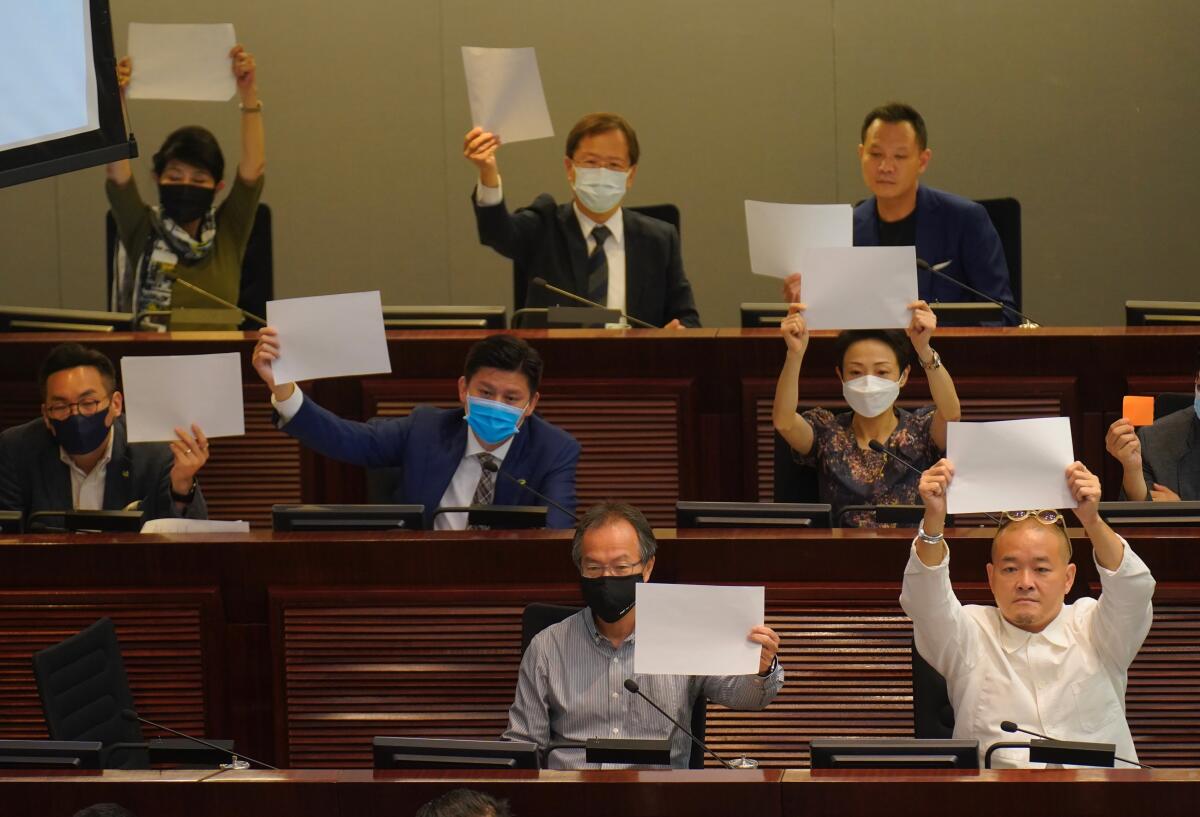Op-Ed: Hong Kong is bracing for a new era of deadly repression

Hong Kong — As a pro-democracy activist in Hong Kong, I have publicly opposed the draconian new national security law imposed on the city by the Beijing government in June. Precisely because I oppose that law, the government of Hong Kong has ruled that I do not qualify to run for a seat on the Hong Kong Legislative Council, the city’s legislature.
The new law, which has been the cause of mass protests, would criminalize free speech, subject protesters to imprisonment, allow searches without court warrants and permit certain trials to be closed to the media and the public.
The government’s perverse rationale for my disqualification on the ballot is that my opposition to the security law means I would not “genuinely and truthfully” uphold the Basic Law, the mini-constitution of Hong Kong.
Eleven other candidates — including four sitting members of the legislature — have also been barred from running in the election, which had been set for Sept. 6. On Friday, the Hong Kong government postponed the elections for a year to further undermine the pro-democracy opposition.
Elections are the bulwark of democracy. But in Hong Kong, they have now been turned into a mechanism to suppress the voice of the people. The screening of opposition candidates in the name of disloyalty to the city’s constitution; disqualifications of pro-democracy legislators; arrest of legislators for their acts within the chamber, and now, an arbitrary postponement of elections are brute authoritarian tactics.
That Beijing would resort to these means with the whole world watching reveals the insecurity of a superpower in handling dissidence in a city of 7 million. But the fight is not over.
The Legislative Council, known as the LegCo, has substantial power to disrupt the rule of the Hong Kong government. This is why the electoral system is designed to prevent a majority that is not obedient to Beijing — half of the seats are not elected by popular vote, but by eligible voters of “functional constituencies,” many of them Beijing loyalists.
However, the democracy movement that took to the streets last year to oppose a proposed extradition law has shifted public opinion so radically against the government that there may be a chance for the opposition to win the majority for the first time.
Last November, the pro-democracy camp won 86% of the contested seats in the city-wide district council elections. The results emboldened the opposition camp to see a viable path toward winning a majority in the LegCo.
An opposition majority would be the nightmare scenario for Beijing. While a pro-democracy majority would not have enough power to pass laws it introduced, it would be able to veto all government proposals and budget.
Beijing reacted frantically, passing the national security law to circumvent Hong Kong’s legislation process. But the law has proved insufficient to contain the call for change: On July 11-12, more than 600,000 voters voted in the primary elections for the pro-democracy camp despite repeated threats from the government that even participating in the primaries could result in prosecution.
This sent a clear message to Beijing that even with the threat of the national security law, it could not prevent the possibility of a pro-democracy majority in the legislative elections. Hence, Carrie Lam, Hong Kong’s chief executive, resorted to postponing the elections, using the coronavirus pandemic as her excuse.
The postponement has raised serious concern: Will it be the end of democratic elections in Hong Kong?
Cancelling elections altogether does not serve the purpose of Beijing. The Chinese leaders want to maintain a façade of democracy but they need the results to be totally under their control — without any opposition candidates. In the coming year, much could be done to shift the political landscape to Beijing’s favor. Even if an election were held next year, it would not in any way represent the will of the people.
First, the government could amend electoral laws. Lam has already suggested setting up polling stations in mainland China, where a considerable population of pro-Beijing elderly Hong Kong voters currently reside. This is a formula that would almost certainly lead to unchecked election fraud.
Second, the security law could be used broadly to imprison activists. Potential candidates like me may be targeted by that law and other criminal statutes. Two of my fellow pro-democracy candidates are now being charged with rioting; by September next year, they may already be in jail.
The survival of the democratic movement in Hong Kong now depends on whether the people can overcome the national security law, both with courage and coordinated actions. Hong Kong has to brace for a new era of deadly repression. But I believe there is hope in our resilience given what this city has already endured.
Gwyneth Ho is a pro-democracy activist in Hong Kong.
More to Read
A cure for the common opinion
Get thought-provoking perspectives with our weekly newsletter.
You may occasionally receive promotional content from the Los Angeles Times.










